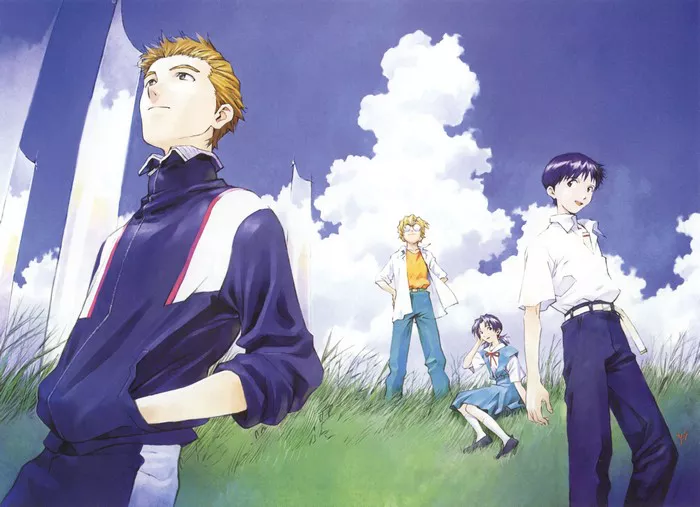The ending of “Neon Genesis Evangelion” has sparked fervent debate and speculation among fans since its release. In the final moments of “The End of Evangelion,” protagonist Shinji Ikari is seen choking his fellow pilot, Asuka Langley Soryu, in a shocking and ambiguous sequence. This perplexing scene has left viewers grappling with questions about its meaning and significance. In this article, we delve into the enigmatic conclusion of “Neon Genesis Evangelion,” exploring the possible reasons behind Shinji’s actions and the broader themes at play in this iconic anime series.
The Complexity of Shinji’s Character
1. A Journey of Self-Discovery
Throughout “Neon Genesis Evangelion,” Shinji undergoes a tumultuous journey of self-discovery and introspection. As the pilot of the Eva Unit-01, he grapples with feelings of inadequacy, loneliness, and existential angst. His relationships with other characters, particularly Asuka, Rei, and his father Gendo, are fraught with complexity and emotional turmoil.
2. Struggling with Identity and Purpose
Shinji’s struggles with identity and purpose are central to his character arc. He grapples with questions of self-worth and belonging, seeking validation and acceptance from those around him. His interactions with Asuka, in particular, reveal the depth of his insecurities and the complexity of his emotions towards others.
3. The Burden of Expectations
Throughout the series, Shinji is burdened by the weight of expectations placed upon him by others, most notably by his father, Gendo. This pressure to perform and live up to perceived standards of success and adequacy exacerbates his internal conflicts and contributes to his feelings of isolation and alienation.
The Climactic Scene: Understanding Shinji’s Actions
1. A Moment of Desperation
The climactic scene in “The End of Evangelion,” where Shinji chokes Asuka, is a culmination of the series’ themes of loneliness, isolation, and existential despair. In this moment of desperation, Shinji’s fragile psyche reaches a breaking point, leading to a violent and disturbing outburst.
2. Expression of Anger and Frustration
Shinji’s actions towards Asuka can be interpreted as an expression of pent-up anger and frustration towards himself and the world around him. Asuka serves as a symbolic representation of Shinji’s inner turmoil and unresolved emotions, and his attack on her may be seen as a manifestation of his self-destructive tendencies.
3. Seeking Connection Through Violence
In choking Asuka, Shinji may be attempting to establish a connection with another human being, albeit in a twisted and destructive manner. His inability to form meaningful connections with others throughout the series has left him feeling profoundly isolated and disconnected from the world, leading him to seek validation through violent means.
Interpreting the Symbolism: Asuka’s Role in Shinji’s Journey
1. A Mirror to Shinji’s Psyche
Asuka’s character serves as a mirror to Shinji’s psyche, reflecting his deepest fears, desires, and insecurities. Their tumultuous relationship is fraught with tension and ambiguity, mirroring Shinji’s internal struggles with identity and self-worth.
2. The Ambiguity of Human Connection
Asuka’s presence in Shinji’s life represents the complexity and ambiguity of human connection. Despite their profound emotional bond, Shinji and Asuka are unable to fully understand or communicate with one another, leading to moments of conflict and misunderstanding.
3. The Duality of Love and Hate
The relationship between Shinji and Asuka is characterized by a duality of love and hate, attraction and repulsion. Their interactions oscillate between moments of tenderness and moments of hostility, reflecting the tumultuous nature of human relationships and the complexities of emotional intimacy.
The Legacy of “Neon Genesis Evangelion”: Impact and Interpretation
1. A Source of Endless Debate
The ending of “Neon Genesis Evangelion” continues to be a subject of debate and interpretation among fans and critics alike. Its enigmatic conclusion has sparked countless theories and analyses, each offering a unique perspective on the series’ themes and symbolism.
2. A Reflection of Human Nature
“Neon Genesis Evangelion” explores themes of identity, isolation, and existential despair with a depth and complexity rarely seen in anime. Its portrayal of flawed and vulnerable characters resonates with audiences on a deeply personal level, inviting reflection on the human condition and the nature of existence.
3. An Enduring Cultural Phenomenon
Despite its initial release over two decades ago, “Neon Genesis Evangelion” remains a cultural phenomenon with a devoted fanbase and enduring influence. Its themes and imagery continue to inspire artists, writers, and filmmakers around the world, cementing its status as a timeless masterpiece of anime storytelling.
Conclusion: Unraveling the Mysteries of “The End of Evangelion”
The enigmatic conclusion of “Neon Genesis Evangelion,” particularly the scene where Shinji chokes Asuka, remains a subject of fascination and debate among fans of the series. While the exact meaning of this climactic moment may never be fully resolved, it serves as a powerful symbol of the series’ themes of loneliness, isolation, and existential despair.
As viewers continue to dissect and analyze the complexities of “The End of Evangelion,” one thing remains certain: the legacy of “Neon Genesis Evangelion” will endure for generations to come, inspiring contemplation and interpretation for years to come.


